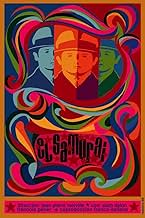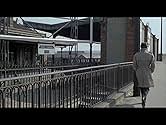Jef Costello, un tueur à gages, est aperçu sur une scène de crime. Principal suspect, il est cependant relâché grâce à un solide alibi. Tous ses faits et gestes sont maintenant épiés par la ... Tout lireJef Costello, un tueur à gages, est aperçu sur une scène de crime. Principal suspect, il est cependant relâché grâce à un solide alibi. Tous ses faits et gestes sont maintenant épiés par la police alors que sa vie est désormais en danger.Jef Costello, un tueur à gages, est aperçu sur une scène de crime. Principal suspect, il est cependant relâché grâce à un solide alibi. Tous ses faits et gestes sont maintenant épiés par la police alors que sa vie est désormais en danger.
- Réalisation
- Scénario
- Casting principal
- Récompenses
- 1 nomination au total
- La pianiste
- (as Caty Rosier)
- Garcia
- (as Jack Léonard)
Avis à la une
In the beginning of the film Melville uses a beautiful static shot of over 4 minutes to establish the audience with a seemingly empty room, then we see smoke circling upwards. There must be someone in the room but it's practically impossible to determine where the smoke is coming from. Finally Jeff Costello gets up from his bed, which wasn't recognizable as such in the first place, and appears on screen. The whole set-up is more reminiscent of a moving replica of a painting by the surrealist Paul Delvaux than anything else in modern cinema. Another surreal set piece is when after his first hit, all possible suspects are brought in at a police station, including Delon himself. Not one by one but all of 'em at the same time. In the next scene we see at least a hundred "gangsters", all wearing trench coats and hats, in a large hall, where they will be interrogated "en plein public". Genuinely strange procedures but handled with such care and stylishness that it becomes completely believable. It gives the somewhat humorous suggestion that the streets of Paris are populated by hundreds, even thousands, of trenchcoat-wearing gangsters, all loners, only seeing each other at card games and occasions like this.
Alain Delon is the perfect embodiment of gangster coolness in this career-defining role as a hit-man in Paris, a modern-day samuraï. "Le Gangster", as the French lovingly call them. Off course, these gangsters don't exist anymore and they probably never existed at all. French Gangsters must have been redefining their look after seeing Delon in this film. His association in real life with French criminal circles, in particular the Marseille underworld, has always given his performances a very strange aura.
As a kid, I regularly visited my grandmother who lived near the city of Marseille and on French television I saw lots of French gangster movies (well, my parents let me watch with them). Alain Delon was in quite a few of them. When I grew older and could identify most of the French screen legends, Delon as no other came to represent the ultimate gangster. An stylized icon of urban cool. I'm also convinced that his character Jef Costello in Le Samouraï was the inspiration for the hissing and whispering fellow in the trench coat in Sesame Street (did he have a name?), something like a gangster, a criminal. A mysterious strange man you should avoid as a kid. I'll be damned if I'm wrong, but I still see Alain Delon in Sesame Street!
This is the best of Melville's thrillers with magnificent Alain Delon as the expressionless murderous . Delon has striven in vain to repeat this success in numerous subsequent movies at the same genre , similar others known actors as Lino Ventura , Jean Paul Belmondo and generally directed by Henri Verneuil , Jose Giovanni and Jacques Deray . The movie packs a splendid cinematography by Henri Decae , the photography glitters as metallic and cold as a gun barrel . The picture was perfectly directed by Jean Pierre Melville , giving a memorable work . Later his beginning as a post-war forerunner of the 'Nouvelle vague' , he left his style in several different ways as a purveyor of a certain kind of noir movie , creating his own company and a tiny studio . Although retaining its essential French touch and developing a style closer to the world of the American film Noir of the 1940s than any of their other such foray s. Dealing with character-studio about roles damned to inevitable tragedies , powerful finale , stylized set pieces heightens the suspense and tension have place all around the Melville's filmmaking . His movies and singular talent are very copied and much-admired by contemporary directors, specially the 'Polar' or noir French cinema , such as : 'Second breath' , 'The red circle', 'Dirty money' and , of course , 'Le samurai'.
This is a work of true cinema. Hollywood tends to forget that cinema is first and foremost a visual art. Le Samurai is a film that could've been made as a silent movie. The director establishes meaning not with dialog but with the best tools available to a director; editing, mise en scenes, cinematography and composition. There is a constant feeling of solitude and isolation. Even when the protagonist finds himself in large groups, his face is pale, his eyes are cast downward and he is still a constant outsider.
On another note, the film looks surprisingly modern. There's none of the graininess of many other 60s and 70s films. Rather, the lighting and the whole visual aesthetic is pitch perfect, from the black and white nightclub (dualism) to the sparse gray apartment to the subterranean eeriness of the Paris subway.
Personally, I would not recommend this film to people not interested in real cinema, people who like 'movies' rather than 'film', simply because there's a strong possibility it will seem extremely annoying and boring to you. On the other hand, if you're a fan of serious cinema, do yourself a favor and watch this film.
Alain Delon's Top 10 Films, Ranked
Alain Delon's Top 10 Films, Ranked
Le saviez-vous
- AnecdotesWhen Jean-Pierre Melville brought a copy of the script to Alain Delon, Delon asked him what the title was. When he was told the title was "Le samouraï", Delon had Melville follow him to his bedroom, where there was only a leather couch and a samurai blade hanging on the wall. Melville had written the screenplay with Delon expressly in mind for the lead.
- GaffesThe streets change from bone dry to soaking wet and raining when Jef flees from the female undercover cop in the Paris Metro.
- Citations
[hitman enters the room of the bar owner]
Martey, Nightclub Owner: Who are you?
Jeff Costello: Doesn't matter.
Martey, Nightclub Owner: What do you want?
Jeff Costello: To kill you.
[shoots him]
- Crédits fousThe movie's Opening Credits include an epigraph: " "There is no solitude greater than a samurai's, unless perhaps it is that of a tiger in the jungle." - The Book of Bushido."
- Versions alternativesThe West German theatrical version was cut by approximately eight minutes.
- ConnexionsFeatured in Zomergasten: Épisode #10.3 (1997)
- Bandes originalesLe Samouraï
Written and Performed by François de Roubaix Et Orchestre
Meilleurs choix
- How long is Le Samouraï?Alimenté par Alexa
Détails
Box-office
- Montant brut aux États-Unis et au Canada
- 216 696 $US
- Week-end de sortie aux États-Unis et au Canada
- 14 899 $US
- 31 mars 2024
- Montant brut mondial
- 343 348 $US
- Durée1 heure 45 minutes
- Rapport de forme
- 1.85 : 1
Contribuer à cette page


![Regarder Bande-annonce [OV]](https://m.media-amazon.com/images/M/MV5BY2YwZTkyOWYtNjU4My00NmVjLWE4ZjMtZTdmZDMyMzJlMjk0XkEyXkFqcGdeQUlNRGJWaWRlb1RodW1ibmFpbFNlcnZpY2U@._V1_QL75_UX500_CR0)


























